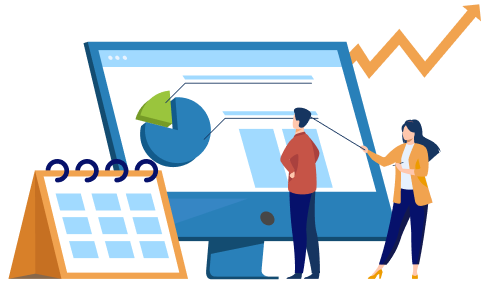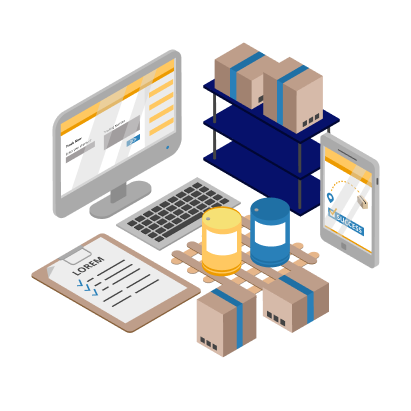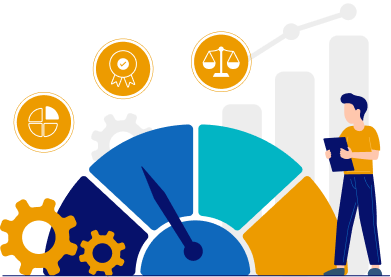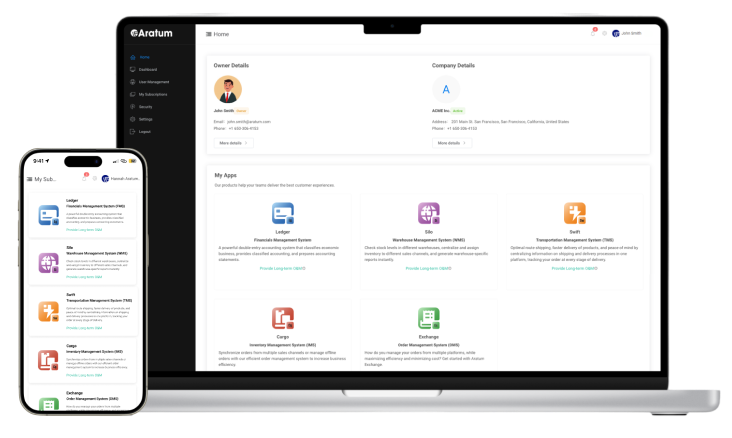Being able to measure your company’s performance is compulsory to identify its key drivers for success and eliminate its detriments. In a fast-paced industry, using manual processes to keep track of your KPIs is no longer the way to go. An enterprise performance management software powered by Aratum’s AI and cloud-based infrastructure ensures you keep up with trends and elevate your business to new heights.
Advanced Analytics and Reporting
Integrated Planning and Budgeting
Performance Monitoring and Management
Supply Chain Optimization
Financial Integration
Data Integration and Connectivity
Risk Management and Compliance
User-Friendly Interface
Collaboration Tools
Sustainability and Environmental Impact
Enterprise performance management software provides real-time insights into supply chain performance. These tools allow businesses to generate detailed reports and visualize data through customizable dashboards, enabling informed decision-making. Predictive analytics use historical data and AI to forecast future trends, helping companies anticipate changes in demand and adjust their supply chain strategies accordingly.

EPM facilitates seamless collaboration across departments, ensuring all stakeholders are aligned. These tools support scenario modeling, allowing users to simulate different business scenarios and evaluate their potential impacts on the supply chain. Automated budgeting features streamline the process, reducing manual effort and improving accuracy.

EPM tracks key performance indicators (KPIs) relevant to supply chain efficiency and effectiveness. The software provides alert and notification systems to warn users of deviations from performance targets or critical supply chain issues. Balanced scorecards offer a comprehensive view of organizational performance, helping managers identify areas for improvement.

EPM enhances efficiency across their operations. Inventory management features optimize stock levels, reducing carrying costs and minimizing stockouts. Demand forecasting improves planning accuracy, while logistics and transportation management enhance the efficiency of these crucial operations, ensuring timely delivery and reducing costs.

Enterprise performance management software enables seamless connectivity with financial systems for consolidated reporting and analysis. These tools monitor and control supply chain costs, helping improve profitability. ROI analysis tools evaluate the return on investment for various supply chain initiatives, aiding in strategic decision-making and resource allocation.

Data integration and connectivity features ensure the EPM software can seamlessly connect with other systems and data sources. ERP integration allows for smooth data flow between enterprise resource planning systems and the EPM software. IoT connectivity enables real-time data collection from connected devices, while APIs and data import/export capabilities facilitate easy integration with external applications.

Enterprise performance management software helps businesses identify and assess potential risks within their supply chains. These features ensure compliance with regulatory requirements and industry standards, reducing the risk of penalties and reputational damage. Contingency planning capabilities enable companies to effectively prepare for and manage supply chain disruptions.

A good EPM software is accessible to all users, regardless of their technical expertise. Intuitive design features simplify navigation and operation, while mobile accessibility allows users to access the software on the go. Comprehensive user training and support ensure all users can maximize the software's potential.

Collaboration tools within EPM software enhance communication and teamwork among supply chain partners. These tools include real-time communication and document management platforms, facilitating seamless sharing of information and resources. Workflow automation features streamline routine processes, improving efficiency and reducing the likelihood of manual errors.

Enterprise performance management software helps businesses track and minimize the environmental footprint of their supply chain activities. These tools monitor resource usage and promote sustainable practices, such as reducing waste and carbon emissions. By supporting green supply chain initiatives, EPM software helps companies meet their sustainability goals and improve their environmental performance.

EPM optimizes inventory management, enhances traceability, and ensures timely delivery of critical medical supplies, ultimately improving patient care and operational efficiency.
EPM optimizes inventory management, enhances omnichannel fulfillment capabilities, and improves customer satisfaction through personalized experiences, driving revenue growth and competitive advantage in a dynamic marketplace.
EPM streamlines manufacturing processes, enhances regulatory compliance, and enables efficient medication distribution. It ensures timely access to life-saving drugs while minimizing waste and cost.
EPM maximizes order fulfillment efficiency, enhances website performance, and ensures seamless integration across multiple sales channels. This enables businesses to deliver exceptional customer experiences and drive sales growth in the digital marketplace.
EPM optimizes route planning, enhances fleet management, and improves shipment tracking capabilities, enabling efficient movement of goods, timely deliveries, and cost-effective operations in a complex and interconnected global logistics network.
EPM ensures precise temperature control, monitors environmental conditions, and maintains product integrity throughout the transportation and storage, safeguarding the quality and safety of temperature-sensitive goods such as food, pharmaceuticals, and biologics.
EPM facilitates real-time transaction processing, enhances risk management capabilities, and ensures regulatory compliance, enabling financial institutions to optimize liquidity management and provide efficient client services.
EPM ensures transparency, accountability, and efficiency in procurement processes. This enables effective resource allocation, timely delivery of public services, and adherence to regulatory requirements, fostering trust and confidence among citizens and stakeholders in government operations.
EPM optimizes production processes, enhances supply chain visibility, and ensures efficient resource utilization, enabling companies to meet customer demand, reduce lead times, and maintain competitive advantage in a rapidly evolving market.
EPM ensures robust threat detection, proactive risk mitigation, compliance with regulatory standards, safeguarding sensitive data protecting critical infrastructure from cyber threats, and maintaining business continuity and trust among stakeholders.
EPM ensures strict adherence to safety regulations, comprehensive risk management practices, and precise inventory tracking, safeguarding against potential hazards and ensuring the secure storage and handling of dangerous materials, thereby protecting personnel and the environment.
EPM optimizes resource management, enhances sustainability practices, and ensures reliable delivery of essential services. This mitigates environmental impact and promotes the efficient use of resources to meet the growing demands for water and energy in a rapidly changing world.

A global CFS warehouse based in Shanghai has faced significant financial and operational challenges, including inaccurate inventory levels, budget overruns, and inefficient forecasting. Delays in processing inbound and outbound packages damaged the company’s cash flow, leading to customers’ disappointment. The company had to compensate its clients through discounts even if it had already suffered from additional freight costs.
Given these challenges, they turned to our solutions to optimize their warehouse operations.
EPM is a set of processes and methodologies organizations use to monitor, measure, and manage their performance across various functions and departments to achieve strategic objectives.
EPM helps organizations align their activities with strategic goals, improve decision-making, optimize resource allocation, and drive continuous improvement in performance.
While BI focuses on analyzing historical data to gain insights, EPM encompasses a broader range of activities including strategic planning, budgeting, and measurement to drive future performance.
Common challenges in enterprise performance management software implementation include data quality issues, resistance to change, siloed organizational structures, and the complexity of integrating multiple systems and processes.
Success can be measured by improvements in key performance indicators (KPIs), alignment of activities with strategic goals, increased agility in decision-making, and enhanced stakeholder satisfaction.
Enterprise performance management software helps organizations identify and assess risks, develop mitigation strategies, monitor risk exposure, and ensure compliance with regulatory requirements, thereby enhancing overall resilience and sustainability.
EPM provides tools and methodologies for setting strategic objectives, developing action plans, allocating resources effectively, and continuously monitoring progress toward goals.
EPM enables organizations to optimize budgeting and forecasting processes, identify cost-saving opportunities, allocate resources more effectively, and improve financial transparency and accountability.
Integration with other processes such as strategic planning, budgeting, and operational execution enables organizations to create a more holistic and cohesive approach to performance management, driving greater alignment and efficiency.
EPM can help organizations enhance customer satisfaction and loyalty by aligning activities with customer needs and expectations, monitoring customer-related KPIs, and continuously improving service delivery processes.

To implement enterprise performance management software, you can rely on Aratum solutions tailored to your business requirements. These solutions can help you get started and gain visibility, efficiency, and resiliency.
Aratum is a globally recognized software provider specializing in developing supply chain management solutions. Our software solutions incorporate advanced algorithms and optimized data structures to facilitate efficient data processing and information dissemination across organizations.
Leveraging cutting-edge technologies such as machine learning and artificial intelligence, the software enables automated decision-making and real-time analytics, enhancing supply chain visibility and improving overall performance.
With a focus on delivering robust and scalable solutions, Aratum is committed to providing our clients with the tools necessary to optimize their supply chain operations and gain a competitive edge in your respective markets.






© 2024 Aratum or an Aratum affiliate company. All rights reserved. No part of this publication may be reproduced or transmitted in any form or for any purpose without the express permission of Aratum or an Aratum affiliate company. The information contained herein may be changed without prior notice. Some software products marketed by Aratum and its distributors contain proprietary software components of other software vendors. National product specifications may vary. These materials are provided by Aratum or an Aratum affiliate company for informational purposes only, without representation or warranty of any kind, and Aratum or its affiliated companies shall not be liable for errors or omissions with respect to the materials. The only warranties for Aratum or Aratum affiliate company products and services are those that are set forth in the express warranty statements accompanying such products and services, if any. Nothing herein should be construed as constituting an additional warranty. In particular, Aratum or its affiliated companies have no obligation to pursue any course of business outlined in this document or any related presentation, or to develop or release any functionality mentioned therein. This document, or any related presentation, and Aratum’s or its affiliated companies’ strategy and possible future developments, products, and/or platforms, directions, and functionality are all subject to change and may be changed by Aratum or its affiliated companies at any time for any reason without notice. The information in this document is not a commitment, promise, or legal obligation to deliver any material, code, or functionality. All forward-looking statements are subject to various risks and uncertainties that could cause actual results to differ materially from expectations. Readers are cautioned not to place undue reliance on these forward-looking statements, and they should not be relied upon in making purchasing decisions. Aratum and other Aratum products and services mentioned herein as well as their respective logos are trademarks or registered trademarks of Aratum (or an Aratum affiliate company) globally. All other product and service names mentioned are the trademarks of their respective companies. See aratum.com for additional trademark information and notices.